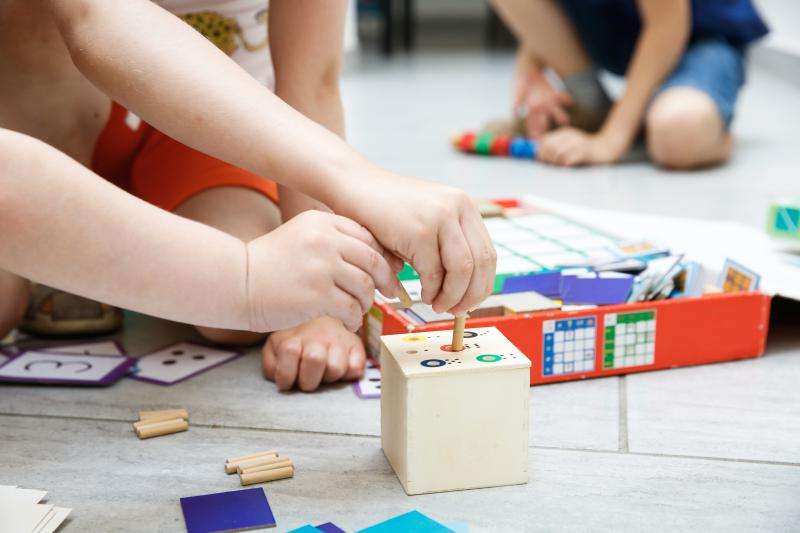How autism apps help kids on the spectrum

Technology is helping children with autism master decidedly non-technical skills.
Children with an autism spectrum disorder can have a range of special needs, such as social or communication difficulties and restrictive or repetitive behaviors.
While technology has always held promise as a therapeutic tool, the customization and personalization of the latest apps are helping children with autism learn to communicate, socialize and master routines in new ways.
"Apps are transformative—they have been shown to improve communication skills, the effectiveness of behavioral therapy and learning and school performance among people with autism," said Dan Smith, Ph.D., vice president of innovative technologies for Autism Speaks, a leading autism research and advocacy organization.
"Some people with autism have a uniquely strong affinity and aptitude for technology, and they actually learn better when teachers and therapists use it, especially if those students find it challenging to engage with people," added Smith. He said that apps can present visual and auditory material consistently and can be customized to fit an individual's needs.
Of course, that's not to say all apps are beneficial and many don't have sufficient evidence backing their effectiveness.
"There are very few apps that have been tested in a meaningful way to prove how they help and whom they help," said Smith.
The Autism Speaks site contains a database of hundreds of apps so users can see what research, if any, is behind each app.
Experts also point out that it's important to monitor a child's use of an app.
"Take time to learn how the app functions, determine how it will benefit the child, and practice using it before you teach it," said Mark Mautone, a special education teacher, the 2015 New Jersey State "Teacher of the Year," and president of Integrated Technology for Persons with Autism and Developmental Disabilities.
Here are some of the top autism apps that are helping kids on the spectrum today.
Social Skills
When it comes to teaching children with autism social skills, a study in the Journal of Autism and Developmental Disorders found that virtual environments may help.

The app Social Skill Builder uses real-life scenarios and interactive videos to help kids learn how to judge a social situation and determine what they should say or do in each one. The video shows a scenario, pauses to prompt the child to click on an appropriate response, and then resumes the video to show the correct one. The app includes nineteen modules ranging from proper greetings and saying "please" and "thank you" to learning not to interrupt or how to properly apologize. (Available for iPad, iTouch and iPhone; $9.99; a Lite version is $2.99.)
Mautone also mentioned Book Creator, which customizes social stories for specific situations or settings. Children can create a book personalized with photos, videos, music text and voice recordings. Using the intuitive interface, children can use the pen tool to draw and annotate the book and can tap the screen to ultimately read and share their work. (Available for iPad; $4.99.)
And nothing beats real-time peer interaction on FaceTime and Skype, said Mautone.
"Teaching children social skills using real-life applications will increase the likelihood that they will demonstrate those skills across various people and settings."
Communication
Many programs have been shown to improve communication, both verbal and nonverbal, in children with autism. Smith said some apps can even help children who aren't verbal generate basic elements of speech for the very first time.
Alpha Writer, based on the Montessori-based movable alphabet, helps children learn to read and write using phonics, phonograms and a special storyboard. One study in Autism: The International Journal of Research and Practice found that children with autism spent more time on reading material when they accessed it through a computer than directly from a book. (Available for iPad, iTouch and iPhone; $2.99.)
Proloquo2Go is an augmentative and alternative communication (AAC) app that uses more than 14,000 symbols and pictures to help people learn how to form sentences. The app allows users to choose between 23 different grid sizes ranging from nine to 144 buttons on the screen, and also allows the user to customize the vocabulary words included. This means the app is appropriate for both people learning to communicate and those who are more advanced. (Available for iPad, iTouch and iPhone; $249.99.)
Since communication apps can vary widely, Mautone recommended that children are evaluated by an AAC specialist to determine which communication system best fits their needs.
"Not every mainstream communication app is appropriate for every child," said Mautone.
"The app you choose should always meet the needs of that particular child."

Fine Motor Skills
Children with autism often have delays with fine motor skills, small muscle movements like those made with their fingers. When looking for apps that can help with fine motor skills, said Mautone, it's important to identifying ones that reinforce writing by having the child use his finger or stylus, as well as motions such as pinching, tapping and rotating the device in various directions.
"There are apps that can increase a child's ability to use a device more effectively but, most importantly, can also transfer into real-life situations," he said.
He pointed to Balloon Maker, a simple app that allows children to hold their finger on a screen to "fill up" a balloon and then tap it to "pop" it. They can also tilt their device to watch the balloons float to one side or the other. (Available for iPad, iPhone and Android devices; $0.99.)
Dexteria helps with fine motor skills by prompting the user to make certain motions, such as having to "pinch" an object on screen, which helps strengthen the pincer grasp needed for skills ranging from writing to self-feeding. (Available for the iPad and iPhone; $3.99.)

Organization and Scheduling
Structure and schedules can be particular important for a child with autism. One study in the Journal of Developmental and Physical Disabilities found that video-based tutorials can help people with autism learn to independently complete certain skills, such as using a washing machine or cooking.
First/Then Visual Schedule allows parents to create a schedule that helps a child visualize their day with timers and check boxes that the child can tick off as they complete each event. It's media-rich and easily customizable, allowing users to insert videos, audio and text that can help a child remember routines or follow step-by-step directions for a specific task such as brushing teeth. (Available for iPad, iTouch, iPhone, $9.99. There's also a version for Android; $4.99.)
Choiceworks is a picture-based app that also helps children complete their daily routines. It includes three customizable boards: One for scheduling, one for waiting that includes a timer and one for feelings that includes flow charts to help children calm down when they're upset. (Available for the iPad, iTouch and iPhone; $6.99.)
Parents should keep in mind that even if an app is backed by research or anecdotal success, the tech might work for one person but not another—it's a matter of trial and error. And nothing beats human interaction with a parent, therapist or educator for learning these life skills.
More information: "The use and understanding of virtual environments by adolescents with autistic spectrum disorders." J Autism Dev Disord. 2004 Aug;34(4):449-66.
Do children with autism learn to read more readily by computer assisted instruction or traditional book methods? A pilot study. Autism. 2002 Mar;6(1):71-91.
"Video Self-Prompting and Mobile Technology to Increase Daily Living and Vocational Independence for Students with Autism Spectrum Disorders." Journal of Developmental and Physical Disabilities June 2012, Volume 24, Issue 3, pp 269-285



















